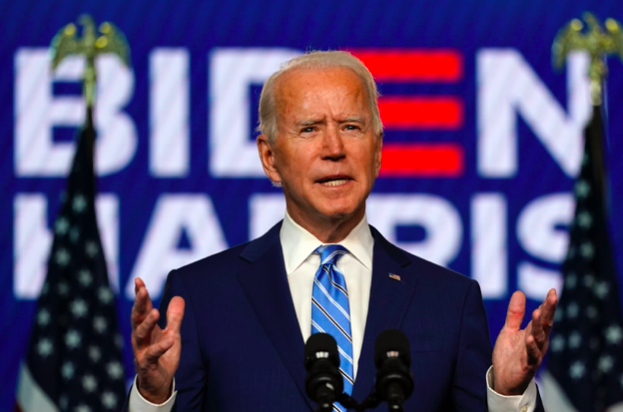A Biden Administration must not continue Democrats’ tendency to take black voters for granted
Democratic presidential candidate former Vice President Joe Biden speaks Wednesday, Nov. 4, 2020, in Wilmington, Del.
Nov 6, 2020
“Lukewarm acceptance is much more bewildering than outright rejection,” Martin Luther King Jr. wrote to describe white moderates in his “Letter From a Birmingham Jail.” Many members of the African American community are feeling this bewilderment with the Democratic Party, as was shown by President Donald Trump’s gain with Black voters.
While Joe Biden largely garnered votes from the Black community, Trump won 8% of the African American vote, according to AP VoteCast. Sean Collins from Vox reported that this is approximately a 2 percentage-point gain from the 2016 election.
According to a CNBC article, the results of this election cycle follow an ongoing trend. “Support for the Democratic ticket has been slipping among African Americans, with the Black male vote dropping to 80% this year, lower than the 82% won by Hillary Clinton in 2016 and the 95% and then 87% that went to Barack Obama’s first and second term, respectively.”
I found myself perplexed by these results. Trump has been blatantly racist on numerous occasions, including calling the Black Lives Matter movement a symbol of hate on Twitter, sharing a video of a man chanting “white power” and refusing to condemn white supremacy in the first presidential debate. Why, then, are around 20% of Black men voting for him?
While Trump is unabashedly racist, Biden is not exactly a champion of anti-racism.
According to the Washington Post, Biden has often touted his friendship with Barack Obama in a feeble attempt to gain favor with the African American community. He has been the target of criticism by Black leaders and activists for “taking the Black vote for granted.”
“I said you’re not fighting hard enough,” said Rev. Greg Lewis, executive director of Souls to the Polls, to the Democratic National Committee. “You can’t assume that they’re automatically going to go out and support you. They don’t believe that this system cares about them.”
In addition to leaning on Obama and Sen. Kamala Harris to gain the Black vote, Biden has also (rightfully) received blowback for a comment he made on “The Breakfast Club” radio show. “If you have a problem figuring out whether you’re for me or Trump, then you ain’t Black,” the former vice president said. He has since apologized for this comment.
Biden has expressed less-than-fervent support for racial justice. During the first presidential debate, Biden responded to a question about his capability to handle race issues with a series of buzzwords: “It’s about equity and equality. It’s about decency. It’s about the Constitution.”
Rather than discussing policy changes that would address racial inequality in housing, income, healthcare and education, Biden relied on this vague answer that danced around the issue of racism — another trend of the Democratic Party.
“I think Black Americans are getting a little bit tired of delivering huge votes for the Democrats and seeing minimal return in terms of economic wealth and closing the wealth gap, the job creation and job opportunities,” Robert Johnson, founder of Black Entertainment Television, told CNBC.
“What I believe is that mainstream media and the White, liberal population in general, the only thing that they address the Black community on is what I call placebo paternalism. We will say nice things about you. We will talk about your suffering. We will say that there’s racism throughout the land,” Johnson continued. “But when you go to the core issues of what Black Americans really need, that’s access to capital, access to wealth and income.”
Following in the footsteps of other white Democrats, Biden perpetuates a “placebo paternalism,” a performative allyship, passive identity politics — call it what you will. But these lofty ideals of “equality” and “equity” will not result in the systemic, largely economic, changes needed to dismantle racism.
The Black population is paid less, is more often homeless and has less access to healthcare coverage than the average American population, yet Biden’s plan is not progressive. It is riddled with the same empty buzzwords that are typically followed by unambitious political action.
One of the main tenets of Biden’s Plan for Black America is “Strengthen America’s commitment to justice,” a prime example of the hollow promises Democrats often make to African Americans. While Biden’s plan does address some important economic issues, it fails to surpass the standard approaches other moderate Democrats have taken in years past. The Black community deserves more.
So, the perplexing voter trends are not so confusing after all.
I speculate that Trump’s gain in Black votes does not reflect the African American community’s unwavering support for Trump but rather a sense of distrust and frustration toward the Democratic Party’s historically lackluster approach to racial and economic justice.
Don’t get me wrong; I voted for Biden. But, we have to keep in mind that being “less racist” than Trump is a pretty low bar. Since when is being “not blatantly racist” enough for anyone, let alone a supposedly progressive political party? While I’m disappointed with the Democrats’ approach to uplift the Black community, I still hope we can welcome the Biden administration, keeping in mind that there’s lots of work to be done.














